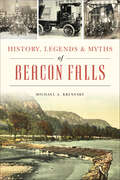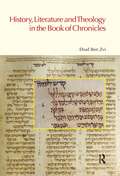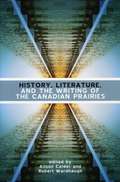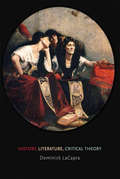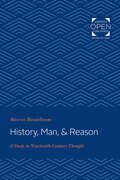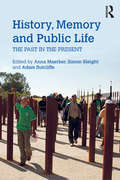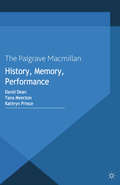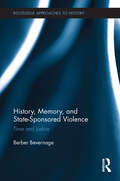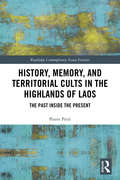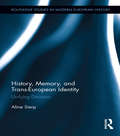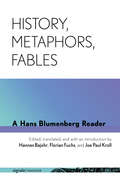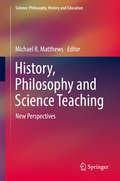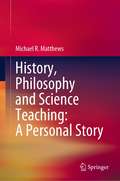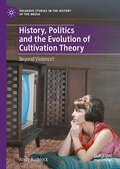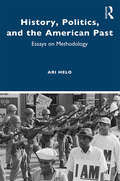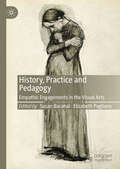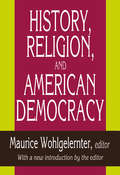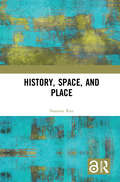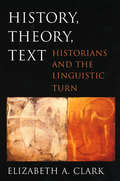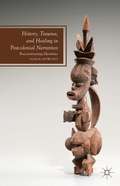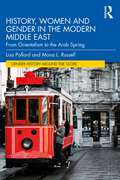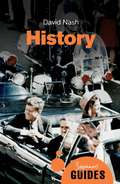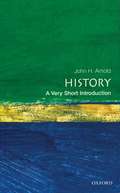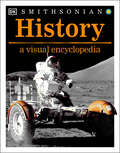- Table View
- List View
History, Legends & Myths of Beacon Falls
by Michael A. KreneskyLike many New England mill towns, Beacon Falls has a history that goes back to the founding of this country. It was called "Brigadoon" by a former state senator, and its past is tied to the invention of vulcanized rubber by Charles Goodyear and the manufacture of woolen shawls for Union troops during the Civil War. Its early Native American roots tell the story of Tobe, a Narragansett Indian who owned most of the western portion of land that became the town in 1871. High Rock Grove brought ten thousand visitors each summer to enjoy the skating rink, band concerts and acclaimed scenic vistas of Long Island Sound. Local author and municipal historian Michael Krenesky reveals some of the fascinating stories behind this jewel of the Naugatuck Valley.
History, Literature and Theology in the Book of Chronicles: History, Literature And Theology In The Book Of Chronicles (BibleWorld)
by Ehud Ben ZviHistory, Literature and Theology in the Book of Chronicles presents a new way of approaching this key biblical text, arguing that the Book employs both multiple viewpoints and the knowledge of the past held by its intended readership to reshape social memory and reinforce the authority of God. The Book of Chronicles communicates to its intended readership a theological worldview built around multiple, partial perspectives which inform and balance each other. This is a worldview which emphasizes the limitations of all human knowledge, even of theologically "proper" knowledge. When Chronicles presents the past as explainable it also affirms that those who inhabited it could not predict the future. And, despite expanding an "explainable" past, the Book deliberately frames some of YHWH's actions - crucial events in Israel's social memory - as unexplainable in human terms. The Book serves to rationalise divinely ordained, prescriptive behaviour through its emphasis on the impossibility of adequate human understanding of a past, present and future governed by YHWH.
History, Literature and the Writing of the Canadian Prairies
by Alison Calder Robert WardhaughThe Canadian Prairie has long been represented as a timeless and unchanging location, defined by settlement and landscape. Now, a new generation of writers and historians challenge that perception and argue, instead, that it is a region with an evolving culture and history. This collection of ten essays explores a more contemporary prairie identity, and reconfigures "the prairie" as a construct that is non-linear and diverse, responding to the impact of geographical, historical, and political currents. These writers explore the connections between document and imagination, between history and culture, and between geography and time.The subjects of the essays range widely: the non-linear structure of Carol Shield's The Stone Diaries; the impact of Aberhart's Social Credit, Marshall McLuhan, and Mesopotamian myth on Robert Kroetsch's prairie postmodernism; the role of document in long prairie poems; the connection between cultural tourism and heritage; the theme of regeneration in Margaret Laurence's Manawaka writing; the influence of imagination on geography in Thomas Wharton's Icefields; and the effects on an alpine climber of pre-WWII ideological concepts of time and individualism.
History, Literature, Critical Theory
by Dominick LacapraIn History, Literature, Critical Theory, Dominick LaCapra continues his exploration of the complex relations between history and literature, here considering history as both process and representation. A trio of chapters at the center of the volume concern the ways in which history and literature (particularly the novel) impact and question each other. In one of the chapters LaCapra revisits Gustave Flaubert, pairing him with Joseph Conrad. Other chapters pair J. M. Coetzee and W. G. Sebald, Jonathan Littell's novel, The Kindly Ones, and Saul Friedlander's two-volume, prizewinning history Nazi Germany and the Jews. A recurrent motif of the book is the role of the sacred, its problematic status in sacrifice, its virulent manifestation in social and political violence (notably the Nazi genocide), its role or transformations in literature and art, and its multivalent expressions in "postsecular" hopes, anxieties, and quests. LaCapra concludes the volume with an essay on the place of violence in the thought of Slavoj Zizek. In LaCapra's view Zizek's provocative thought "at times has uncanny echoes of earlier reflections on, or apologies for, political and seemingly regenerative, even sacralized violence."
History, Man, and Reason: A Study in Nineteenth-Century Thought
by Maurice MandelbaumOriginally published in 1971. The purpose of this book is to draw attention to important aspects of thought in the nineteenth century. While its central concerns lie within the philosophic tradition, materials drawn from the social sciences and elsewhere provide important illustrations of the intellectual movements that the author attempts to trace. This book aims at examining philosophic modes of thought as well as sifting presuppositions held in common by a diverse group of thinkers whose antecedents and whose intentions often had little in common. After a preliminary tracing of the main strands of continuity within philosophy itself, the author concentrates on how, out of diverse and disparate sources, certain common beliefs and attitudes regarding history, man, and reason came to pervade a great deal of nineteenth-century thought. Geographically, this book focuses on English, French, and German thought. Mandelbaum believes that views regarding history and man and reason pose problems for philosophy, and he offers critical discussions of some of those problems at the conclusions of parts 2, 3, and 4.
History, Memory and Public Life: The Past in the Present
by Adam Sutcliffe Anna Maerker Simon SleightHistory, Memory and Public Life introduces readers to key themes in the study of historical memory and its significance by considering the role of historical expertise and understanding in contemporary public reflection on the past. Divided into two parts, the book addresses both the theoretical and applied aspects of historical memory studies. ‘Approaches to history and memory‘ introduces key methodological and theoretical issues within the field, such as postcolonialism, sites of memory, myths of national origins, and questions raised by memorialisation and museum presentation. ‘Difficult pasts‘ looks at history and memory in practice through a range of case studies on contested, complex or traumatic memories, including the Northern Ireland Troubles, post-apartheid South Africa and the Holocaust. Examining the intersection between history and memory from a wide range of perspectives, and supported by guidance on further reading and online resources, this book is ideal for students of history as well as those working within the broad interdisciplinary field of memory studies.
History, Memory, Performance
by Kathryn Prince David Dean Yana MeerzonHistory, Memory, Performance is an interdisciplinary collection of essays exploring performances of the past in a wide range of trans-national and historical contexts. At its core are contributions from theatre scholars and public historians discussing how historical meaning is shaped through performance.
History, Memory, and State-Sponsored Violence: Time and Justice (Routledge Approaches to History)
by Berber BevernageModern historiography embraces the notion that time is irreversible, implying that the past should be imagined as something ‘absent’ or ‘distant.’ Victims of historical injustice, however, in contrast, often claim that the past got ‘stuck’ in the present and that it retains a haunting presence. History, Memory, and State-Sponsored Violence is centered around the provocative thesis that the way one deals with historical injustice and the ethics of history is strongly dependent on the way one conceives of historical time; that the concept of time traditionally used by historians is structurally more compatible with the perpetrators’ than the victims’ point of view. Demonstrating that the claim of victims about the continuing presence of the past should be taken seriously, instead of being treated as merely metaphorical, Berber Bevernage argues that a genuine understanding of the ‘irrevocable’ past demands a radical break with modern historical discourse and the concept of time. By embedding a profound philosophical reflection on the themes of historical time and historical discourse in a concrete series of case studies, this project transcends the traditional divide between ‘empirical’ historiography on the one hand and the so called ‘theoretical’ approaches to history on the other. It also breaks with the conventional ‘analytical’ philosophy of history that has been dominant during the last decades, raising a series of long-neglected ‘big questions’ about the historical condition – questions about historical time, the unity of history, and the ontological status of present and past –programmatically pleading for a new historical ethics.
History, Memory, and Territorial Cults in the Highlands of Laos: The Past Inside the Present (Routledge Contemporary Asian Societies)
by Pierre PetitThis book captures the dynamics of history, memory, and territorial cults in Houay Yong, a Tai Vat village situated in the multiethnic highland frontier between Laos and Vietnam. By taking seriously the experiences of the villagers, it partakes in a broader movement to reintegrate highlanders and their agency into history at large. Based on comprehensive fieldwork research and the examination of colonial archives, this book makes accessible, for an English-speaking audience, untapped French archives on Laos and early publications on territorial cults written by French ethnologists. In so doing, it provides a balanced perspective, drawing from the fields of memory studies and classical historical research. Following a chronological approach stretching from the nineteenth century to the present, it extends narrative analysis through a comparative ethnography of territorial cults, a key component of the performative and material presentification of the past. Highly interdisciplinary in nature, History, Memory and Territorial Cults in the Highlands of Laos will be useful to students and scholars of anthropology, history, and religious studies, as well as Asian culture and society.
History, Memory, and Trans-European Identity: Unifying Divisions (Routledge Studies in Modern European History #23)
by Aline SierpThis book questions the presupposition voiced by many historians and political scientists that political experiences in Europe continue to be interpreted in terms of national history, and that a European community of remembrance still does not exist. By tracing the evolution of specific memory cultures in two successor countries of the Fascist/Nazi regime (Italy and Germany) and the impact of structural changes upon them, the book investigates wider democratic processes, particularly concerning the conservation and transmission of values and the definition of identity on different levels. It argues that the creation of a transnational European memory culture does not necessarily imply the erasure of national and local forms of remembrance. It rather means the creation of a further supranational arena where diverging memories can find their expression and can be dealt with in a different way. Through the triangulation of agents of memory construction, constraints and opportunities and actual portrayals of the past, this volume explores the difficulties faced by a multinational entity like the EU in reaching some kind of consensus on such a sensitive subject as history.
History, Metaphors, Fables: A Hans Blumenberg Reader (signale|TRANSFER: German Thought in Translation)
by Hans BlumenbergHistory, Metaphors, and Fables collects the central writings by Hans Blumenberg and covers topics such as on the philosophy of language, metaphor theory, non-conceptuality, aesthetics, politics, and literary studies. This landmark volume demonstrates Blumenberg's intellectual breadth and gives an overview of his thematic and stylistic range over four decades. Blumenberg's early philosophy of technology becomes tangible, as does his critique of linguistic perfectibility and conceptual thought, his theory of history as successive concepts of reality", his anthropology, or his studies of literature. History, Metaphors, Fables allows readers to discover a master thinker whose role in the German intellectual post-war scene can hardly be overestimated.
History, Philosophy and Science Teaching
by Michael R. MatthewsProduced by the Ontario Institute for Studies in Education, this inaugural volume in a new series contains 17 articles (most previously published) by historians, philosophers, psychologists, natural scientists, and science educators who advocate the teaching of science from a broader view in order to improve students' perception of the discipline, increase the development of critical skills, and retain a greater number of students in the field. Annotation copyrighted by Book News, Inc. , Portland, OR
History, Philosophy and Science Teaching: A Personal Story
by Michael R. MatthewsThis book is an historical narrative of academic appointments, significant personal and collaborative research endeavours, and important editorial and institutional engagements. For forty years Michael Matthews has been a prominent international researcher, author, editor and organiser in the field of ‘History, Philosophy and Science Teaching’. He has systematically brought his own discipline training in science, psychology, philosophy of education, and the history and philosophy of science, to bear upon theoretical, curricular and pedagogical issues in science education. The book includes accounts of philosophers who greatly influenced his own thinking and who also were personal friends – Wallis Suchting, Abner Shimony, Robert Cohen, Marx Wartofsky, Israel Scheffler, Michael Martin and Mario Bunge. It advocates the importance of clear writing and avoidance of faddism in both philosophy and in education. It concludes with a proposal for informed and enlightened science teacher education.
History, Politics and the Evolution of Cultivation Theory: Beyond Violence? (Palgrave Studies in the History of the Media)
by Andy RuddockThis book provides a cultural history of cultivation theory, a North American mass communication paradigm best known for arguing that television violence was a potent agent of political socialisation. Decades after its inception, cultivation theory remains an evocative force in imagining twenty-first-century media power. This book reveals how many factors shaped the theory: the spectre of twentieth-century fascism, the Cold War, political turbulence in 1960s America, and the realisation that television had profoundly altered the rhythms of social and political life. The book also explains how cultivation theory became a means of analysing diverse media influences, thanks to various scholars who brought different motivations, perspectives and skills to the project. Cultivation theory succeeded because its practitioners related their work to the changing political moods of post-war America. In doing so, they created a unique critical perspective within mass communication research, which continues to shed light on the role media play in political conflict.
History, Politics, and the American Past: Essays on Methodology
by Ari HeloHistory, Politics, and the American Past assesses the connection between historiography and politics in America on the basis of an important methodological distinction between the past and the history written about it. While necessarily interpreting the past, professional historians and those with a general interest alike remain tempted, consciously or not, to make American history serve their own political and moral views. There is a tendency to impose our present values on the past and sometimes go so far as to believe the past can be changed by present action. In this volume, Ari Helo analyzes examples of this, including metahistorical narratives, presidential speeches, and the occasionally vague rhetoric of the Confederate statue campaigns, before diagnosing the source of doing so and suggesting how we might avoid it. Taking America as its example, the book illuminates essential methodological issues related to history writing while deciphering the complicated relationship of history and politics. The book will be of interest to scholars and students of American history, historiography, American studies, and cultural studies, providing a vivid account of how to make sense of American history.
History, Practice and Pedagogy: Empathic Engagements in the Visual Arts
by Susan Barahal Elizabeth PuglianoThis edited volume explores the historical, practical and pedagogical possibilities for expressing and cultivating empathy through works of art. While aspects of what we today recognize as empathy has nestled in the artistic experiences and philosophies of all ages, the subjective and elusive nature of empathic responses has often resulted in the relegation of empathy to the margins of art historical inquiry. Moving into the second quarter of the twenty-first century, amidst global health crises, civic unrest, political turmoil, and persistent social inequities and injustices, this capacity to feel with and as someone or something outside of ourselves is more critical than ever. Probing the very notion of empathy, contributions address themes ranging from environmental and social justice to identity and inclusion to transdisciplinary pedagogies and practices, each with a critical eye to how works of art not only appeal to empathic sensibilities, but might play an active role in developing capacities for empathy in viewers.
History, Religion, and American Democracy
by Maurice WohlgelernterHistory, Religion, and American Democracy provides a fundamental review of four major themes: naturalism and supernaturalism in an American context; issues in the history of Judaism; American social philosophy; and the teaching and learning of democratic ideals in a pluralistic postmodern environment. This book provides a naturalistic context for the deep analysis of religious, theological, as well as social and political themes.
History, Space and Place
by Susanne RauSpaces, too, have a history. And history always takes place in spaces. But what do historians mean when they use the word "spaces"? And how can spaces be historically investigated? Susanne Rau provides a survey of the history of Western concepts of space, opens up interdisciplinary approaches to the phenomenon of space in fields ranging from physics and geography to philosophy and sociology, and explains how historical spatial analysis can be methodologically and conceptually conceived and carried out in practice. The case studies presented in the book come from the fields of urban history, the history of trade, and global history including the history of cartography, but its analysis is equally relevant to other fields of inquiry. This book offers the first comprehensive introduction to the theory and methodology of historical spatial analysis.
History, Theory, Text: Historians and the Linguistic Turn
by Elizabeth A. ClarkIn this work of sweeping erudition, one of our foremost historians of early Christianity considers a variety of theoretical critiques to examine the problems and opportunities posed by the ways in which history is written. Elizabeth Clark argues forcefully for a renewal of the study of premodern Western history through engagement with the kinds of critical methods that have transformed other humanities disciplines in recent decades. History, Theory, Text provides a user-friendly survey of crucial developments in nineteenth- and twentieth-century debates surrounding history, philosophy, and critical theory. Beginning with the "noble dream" of "history as it really was" in the works of Leopold von Ranke, Clark goes on to review Anglo-American philosophies of history, schools of twentieth-century historiography, structuralism, the debate over narrative history, the changing fate of the history of ideas, and the impact of interpretive anthropology and literary theory on current historical scholarship. In a concluding chapter she offers some practical case studies to illustrate how attending to theoretical considerations can illuminate the study of premodernity. Written with energy and clarity, History, Theory, Text is a clarion call to historians for richer and more imaginative use of contemporary theory.
History, Trauma, and Healing in Postcolonial Narratives: Reconstructing Identities (The Future of Minority Studies)
by Ogaga IfowodoWhat would it mean to read postcolonial writings under the prism of trauma? Ogaga Ifowodo tackles these questions through a psycho-social examination of the lingering impact of imperialist domination, resulting in a refreshing complement to the cultural-materialist studies that dominate the field.
History, Women and Gender in the Modern Middle East: From Orientalism to the Arab Spring
by Lisa Pollard Mona L. RussellThis introductory text explores the gendered history of the modern Middle East, from the eighteenth century to the present, studying the various ways in which gender has defined the region and shaped relations in the modern era. The book captures three aspects of change simultaneously: the events that mark the “modern” Middle East, women’s encounters with the transition to modernity and gendered responses to modernity. It contains both new fieldwork and a synthesis of secondary scholarship that highlight the role of gender in the modernization of Egypt, Turkey, Iran, the Levant and the Persian Gulf states. Chapters are organized chronologically to chart the rapid developments of the modern era, but each chapter also stands on its own, with coverage of masculinity and femininity, sexuality, marriage and the family, labor and women’s contributions to Arab Spring uprisings. Through this comprehensive account, the book pushes back on stereotypes that the Middle East is an ahistorical region and that women have not been vital actors in the process of change. Richly illustrated and accessible for a variety of readers, History, Women and Gender in the Modern Middle East is an ideal resource for undergraduate and postgraduate students in gender studies and Middle Eastern history.
History: A Beginner's Guide (Beginner's Guides)
by David NashWhy study history? What's the point? Through compelling historical narratives, such as the assassination of President Kennedy, Dr. David Nash introduces the central elements of the subject. Readers learn how history seeks to explain, categorize and make sense of events of the past. It is a search for truth which involves searching for sources and then scrutinizing them to try and determine how reliable they are. Nash explores how new interpretations can change our understanding of what was previously an established version of history and what lasting contribution the study of history can make to society and, indeed, civilization.Ideal for those with an emerging interest in history, the book is designed to provide readers with a toolkit for further investigation of the subject.
History: A Novel
by William Weaver Lily Tuck Elsa MoranteHistory was written nearly thirty years after Elsa Morante and Alberto Moravia spent a year in hiding among remote farming villages in the mountains south of Rome. There she witnessed the full impact of the war and first formed the ambition to write an account of what history - the great political events driven by men of power, wealth, and ambition - does when it reaches the realm of ordinary people struggling for life and bread. The central character in this powerful and unforgiving novel is Ida Mancuso, a schoolteacher whose husband has died and whose feckless teenage son treats the war as his playground. A German soldier on his way to North Africa rapes her, falls in love with her, and leaves her pregnant with a boy whose survival becomes Ida's passion. Around these two other characters come and go, each caught up by the war which is like a river in flood. We catch glimpses of bombing raids, street crimes, a cattle car from which human cries emerge, an Italian soldier succumbing to frostbite on the Russian front, the dumb endurance of peasants who have lived their whole lives with nothing and now must get by with less than nothing.
History: A Very Short Introduction
by John H. ArnoldStarting with an examination of how historians work, this "Very Short Introduction" aims to explore history in a general, pithy, and accessible manner, rather than to delve into specific periods.
History: A Visual Encyclopedia (DK Children's Visual Encyclopedias)
by DKThis lavishly illustrated visual encyclopedia tells the story of our world in depth and detail from the dawn of civilization to the present day.Charting human endeavor from every angle, SI History chronicles the significant events, ground-breaking ideas, political forces, and technological advances that have shaped our planet. Every historical episode is explored and explained with the help of stunning images that bring the authoritative text to life. Important points in history, from the battle of Hastings and the storming of the Bastille to D-Day and 9/11, have clear but concise coverage, together with profiles of influential figures, such as Julius Caesar, Cleopatra, and Nelson Mandela. It&’s time to head back in time and explore the past with this striking history book, which features: - Profiles of key people who have made history.- Features on inventions, discoveries, and ideas that changed the world.- Graphics lend immediacy and impact to key statistics.- National Histories section separately chronicles key events of every countryAs each moment in history is defined and detailed, supporting panels note the causes and consequences, providing wider context and broadening our horizons. New and enhanced coverage of recent events – such as the Arab Spring – and contemporary issues such as climate change and the COVID-19 pandemic, bring the book firmly into the present. With its broad-themed approach to important historical events, this book shows that ours is a history with genes and viruses, not just battle and treaties – and the stories and biographies of men and women from every corner of the globe who have shaped today&’s world reaffirm that SI History is the story of humankind in which everyone has a part to play.
